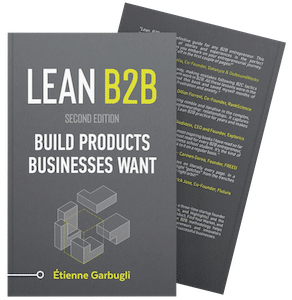Brant Cooper is the New York Times bestselling author of The Lean Entrepreneur and Co-founder of Moves the Needle. His most recent book project is The Lean Brand, bringing the rigor of lean startup principles to the marketing black box of branding.
Much like Ben Yoskovitz, Brant was a key contributor to Lean B2B: Build Products Businesses Want.
Here’s the first part of our discussion for the book:
EG: In your perspective, what are the main differences between B2B and B2C startups?
Brant Cooper (BC): Well, I think you have to validate with a lot more customers in B2C, but it’s sort of not a – there’s different business models that go with each, and so the real differences are between the different business models, not necessarily B2C versus B2B. That’s kind of a broad way to look at it.
EG: In that case, do you think it’s possible for an entrepreneur to start a business without knowing if it’s going to be B2B or B2C?
BC: Yeah, people actually do, especially in two-sided marketplaces. You might be doing both, or people start off with: “Listen, I’m trying to sell this to a particular company,” and then they figure out that that the company really has to sell that to consumers, and then it ends up being the responsibility of the entrepreneurs to sell directly to the consumers.
EG: And do you think that calls for a different skillset for the entrepreneurs?
BC: Yeah, probably, but I mean it really kind of depends. I mean I think there are tons of people that are starting startups with no experience at all, so I guess it doesn’t matter then, right? They can start with consumers and then go to [B2B]. All of this stuff, I think, is learnable, so I think it’s not that oh, somebody has 20 years domain expertise selling to businesses. Therefore, they can’t sell to consumers. I don’t believe that. As long as they’re willing to learn what is known versus unknown. And you execute on what is known and you go learn what is unknown.
EG: So, it’s not a dead end.
BC: It’s not a dead end. You can certainly hire people with the domain expertise that you want. You just have to be careful with hiring domain expertise because they’re going to know a lot about an industry in the old way, but the moment you’re disrupting that industry, then they don’t know if that disruption will work. They actually think that the disruption won’t work, because that’s their expertise. It’s in the way it is now, not the way it’s going to become.
EG: You’re saying it’s actually an advantage for them not knowing the industry because they just go?
BC: I see entrepreneurs that are being told all the time: “Go find advisors that are in that domain.” Now, it’s great to have those advisors in order to get connections, go figure out who to sell to, but if you’re actually taking advice about whether your disruption is going to work, then the person with 20 or 30 years in the industry is the last person that you want to ask. Go ask. I was at this breakfast meeting, where we were talking about crowdfunding. So, there were crowdfunding entrepreneurs there and there were venture capitalists there, and the venture capitalists were all like: “It’ll never work.”
It’s because they’re locked inside of how that business works now, so they can’t see outside of that domain expertise to see that crowdfunding could come in there and maybe just completely flip it on its head.
EG: In that case, do you think credibility is overrated in some ways? For example, if I don’t have any experience selling recruitment software, is it a big deal if I don’t have credibility from the get-go in that industry?
BC: I think if you can demonstrate domain experience, knowing the market well, I think it’s fine. I can see that people would want you to have experience there, but yeah, I think it’s probably overrated. Some of the biggest disruptions happen with young entrepreneurs because they don’t know anything.
So, the thing is that you try to find those experts in order to achieve specific objectives. So, instead of just thinking about it in general terms, what would you want from that domain experience? If you want relationships, then yeah, you go do it. If you’ve already learned how to sell your disruptive product, then you can hire salespeople with experience because they’ve got the Rolodex. And it’s always keeping in mind what is the objective for why I want this person to have X experience.
EG: What do you think are the biggest challenges for B2B entrepreneurs?
BC: I think the biggest challenge is that there are multiple players inside those larger organizations, and so there’s a whole map that they have to figure out on what the buying process looks like. And I say buying process purposefully. It’s not really about the selling process until you’ve actually figured out what the buying process is because they will follow the process that they follow, not what you want them to follow. And so, like in my workshops, I do different exercises around personas and creating a value stream. A set of assumptions around what your value stream might look like.
And inevitably, if you’re in the B2B world, the entrepreneur is going: “Well, but how do I do this when I’ve got the CFO and the CEO,” and I go: “Yeah, you’ve got to create a map of all of those people.” Who is going to be your internal champion? Who is going to object to you being in there? So, who’s going to try to kill the deal? What are the objections going to be? How can you front-load how to overcome these objections? And it really – I think that the tendency is for a lot of entrepreneurs, is to immediately go hire a seasoned VP of Sales who has sold into enterprises for 20 to 30 years, and that person might fail if what they do is just try to go and execute the way they’ve always executed.
You have to have that type of sales-focused entrepreneur, or entrepreneur-focused salesperson who is going to go in there and learn what the tricks are, learn what that buying process is, learning what the whole map is, and then trying to replicate that. And so, I think that because it’s complicated, entrepreneurs often sell into several different market segments at the same time, because they’re opportunistic.
It takes them a long time to sell. Somebody is actually offering you money. It’s really hard to say no. So, what happens is they’ve actually hit some numbers. They look like they’ve got some traction, but it turns out that they’ve got customers in several different market segments. And then what happens is, is that the sales and marketing process is not repeatable. It takes different sales tactics, different objections, different product features, different assumptions about who the partners are and the systems integrators, and so I think that’s another really tough thing for entrepreneurs, is to understand what is the pattern of my market segment. What are the similarities between these people that have bought and how can I make sure that I’m tackling one market segment than trying to dominate that before I scale the other market segments?
To be continued…
Subscribe to this blog. In the next few weeks, we’ll publish the second part of our discussion with Brant Cooper where he talks about selecting problems, finding early adopters, conducting interviews, and evaluating product-market fit (UPDATE: you can read the second part here).
More on Brant Cooper
- An Exclusive Interview with Brant Cooper, Author of The Lean Entrepreneur – Part 2
- Moves the Needle (His Company)
- The 18 Best Quotes from Lean B2B: Build Products Businesses Want
Download the First 4 Chapters Free
Learn the major differences between B2B and B2C customer development, how to think about business ideas, and how to assess a venture’s risk in this 70-page sampler.
Working on a B2B Startup?
Learn B2B customer development with our free email course:



